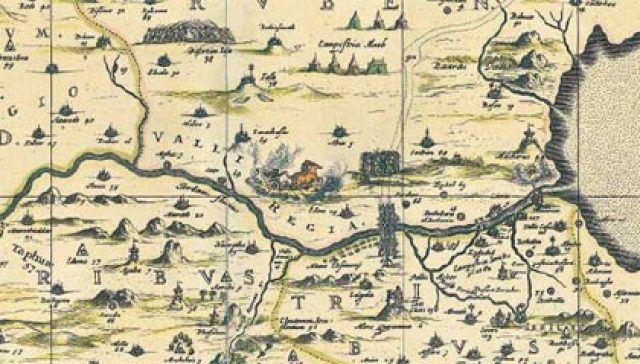The people of Israel (also called the "Jewish People") trace their origin to Abraham, who established the belief that there is only one God, the creator of the universe (see Torah). Abraham, his son Yitshak (Isaac), and grandson Jacob (Israel) are referred to as the patriarchs of the Israelites. All three patriarchs lived in the Land of Canaan, that later came to be known as the Land of Israel. They and their wives are buried in the Ma'arat HaMachpela, the Tomb of the Patriarchs, in Hebron (Genesis Chapter 23).
The name Israel derives from the name given to Jacob (Genesis 32:29). His 12 sons were the kernels of 12 tribes that later developed into the Jewish nation. The name Jew derives from Yehuda (Judah) one of the 12 sons of Jacob (Reuben, Shimon, Levi, Yehuda, Dan, Naphtali, Gad, Asher, Yisachar, Zevulun, Yosef, Binyamin)(Exodus 1:1). So, the names Israel, Israeli or Jewish refer to people of the same origin.
The descendants of Abraham crystallized into a nation at about 1300 BCE after their Exodus from Egypt under the leadership of Moses (Moshe in Hebrew). Soon after the Exodus, Moses transmitted to the people of this newly emerging nation, the Torah, and the Ten Commandments (Exodus Chapter 20). After 40 years in the Sinai desert, Moses led them to the Land of Israel, that is cited in The Bible as the land promised by G-d to the descendants of the patriarchs, Abraham, Isaac, and Jacob (Genesis 17:8).
The people of modern day Israel share the same language and culture shaped by the Jewish heritage and religion passed through generations starting with the founding father Abraham (ca. 1800 BCE). Thus, Jews have had a continuous presence in the land of Israel for the past 3,300 years.
The rule of Israelites in the land of Israel starts with the conquests of Joshua (ca. 1250 BCE). The period from 1000-587 BCE is known as the "Period of the Kings". The most noteworthy kings were King David (1010-970 BCE), who made Jerusalem the Capital of Israel, and his son Solomon (Shlomo, 970-931 BCE), who built the first Temple in Jerusalem as prescribed in the Tanach (Old Testament).
In 587 BCE, Babylonian Nebuchadnezzar's army captured Jerusalem, destroyed the Temple, and exiled the Jews to Babylon (modern day Iraq).
The year 587 BCE marks a turning point in the history of the region. From this year onwards, the region was ruled or controlled by a succession of superpower empires of the time in the following order: Babylonian, Persian, Greek Hellenistic, Roman and Byzantine Empires, Islamic and Christian crusaders, Ottoman Empire, and the British Empire.

